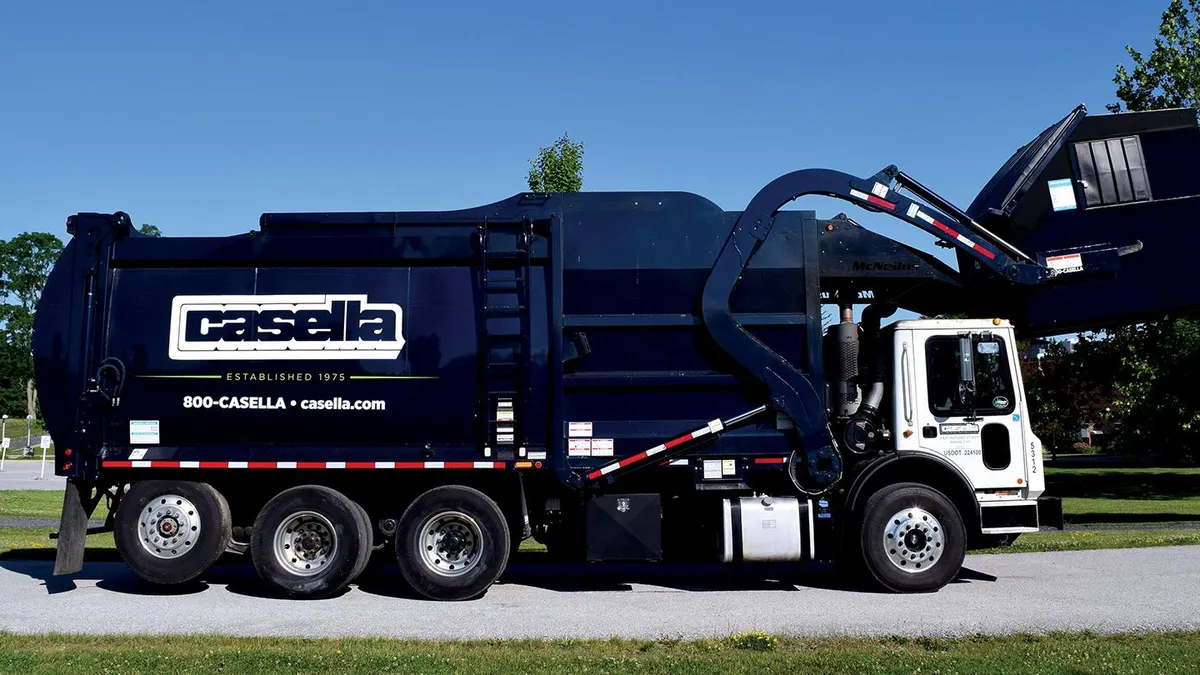Q1 Earnings
| Revenue | $147.5M |
| YoY Change | 10.2%▲ |
| Adjusted EBITDA | $24.6M |
| YoY Change | 6.4%▲ |
Like its larger publicly traded counterparts, Casella Waste Systems is experiencing an "absolute stellar period for solid waste," with positive numbers all around, but recycling revenues are down significantly. That aspect of the business took up a fairly large portion of the company's Q1 earnings call, yielding detailed comments from the company's executives.
Recycling:
- Casella's projections for recycling revenue were off by an estimated $2 million for the first quarter and the company now estimates it will see a $6 million hit to adjusted EBITDA for 2018. Average commodity revenues were down 46% YoY, driven by a 90% drop in mixed paper and a 50% drop in OCC.
- Operating costs were up by $2.3 million due to slower line speeds, higher residue expenses and transportation. CEO John Casella said exporting material to India or Vietnam now costs double what it was to export to China. Plus, China's 0.5% contamination has also become the de facto standard for other markets.
- "We just don't see anything that gives us a sense that we are going to see any significant price increases at this point. In fact, I think that there is a potential that things could get more difficult if India, Thailand and Vietnam gets saturated with mixed paper," said Casella.
As Casella noted in his opening remarks, "Recycling, as we know it today, appears to be changing rapidly before our eyes due to geopolitical dynamics with China." This was one day after the latest news of a one month freeze on all U.S. scrap imports to the country, though that was not mentioned during the call.
Casella doesn't expect any new processing capacity will come on for at least 6-12 months or for commodity prices to rebound in "the foreseeable future." What this means for stockpiling or short-term disposal necessity remains unclear, but Casella made a point of reminding analysts the majority of states it's in have some form of disposal ban or recycling requirement.
For the municipal customers in these states, many have already seen costs begin to shift based on the company's SRA fee. Some older and longer-term deals may not be exempt from higher prices in this new environment, either. Casella noted the company is taking a "pretty aggressive role with regard to force majeure embargo" on three to five cities "to fix that."
Landfills & Pricing:
As indicated in a recent interview with Waste Dive, Casella's landfills are seen as a vital asset in the capacity-starved Northeast. When the economics line up, Casella said he will gladly "cannibalize ourselves in the landfill before somebody else does." Right now, no one seems too interested in doing that.
- Landfill pricing was up 4.9% and volume was up 18.7% year over year. Casella saw 6.6% solid waste volume growth, with more than half of that coming from a one-time $3.5 million soil remediation project, and the rest driven by landfill volumes.
- Casella estimates the company has close to 1 million tons of excess capacity and is in the "fourth or fifth inning in terms of moving out the lower price waste." A March permit approval for the Juniper Ridge Landfill in Maine will help, though much of the opportunity is in upstate New York.
- In a reminder of tough Northeast landfill politics, the company reported a $1.6 million closure charge for its Southbridge site in Massachusetts. That site is set to close at the end of this year, earlier than the company had hoped, and much of the waste is expected to go to another Casella landfill in New York's Chemung County.
Looking Ahead:
The Casella team also touched on other areas of interest both for the Northeast and the broader U.S. market.
- The outlook for glass recycling has not improved following the closure of a key Massachusetts bottling plant. COO Ed Johnson said conversations are ongoing about construction aggregate potential with state officials about reworking beneficial reuse specifications that are considered "too stringent and won't allow it to get done in a commercially viable manner."
- Labor costs remain an ongoing priority. The company is looking at upgrading MRF equipment to offset that at some facilities and rolling out new targeted programs to improve hiring opportunities for mechanics and drivers.
- The acquisition of Complete Disposal in Massachusetts, along with two tuck-ins in Vermont and New York, are expected to drive $20 million in annual revenues. Casella said the company is "in a unique position to grow our free cash flow at 10% to 15% per year" based on organic growth and other possibilities in the pipeline.










